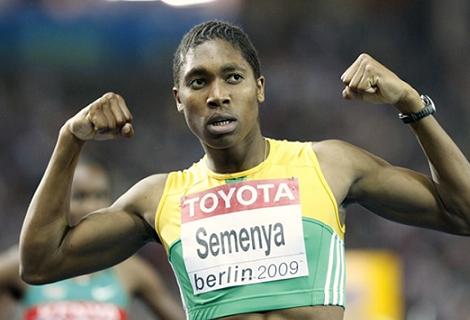Caster Semenya is not ‘normal’ enough?

Photo Credit: UltraNoticias flickr.com
Caster Semenya at the Berlin 2009 World Championships in Athletics.
November 14, 2019
Recently attention has been brought to the case of star female athlete Caster Semenya, who has been banned from competing due to her naturally high levels of testosterone. The Swiss Supreme Court overturned a past suspension of the IAAF (International Associate of Athletes Federation) regulations. The suspension allowed athletes with differences in sexual development to compete without having to take drugs. Now, Caster and many other athletes who are similarly built will be required to take medication to reduce the influence of their biological differences in order to compete ‘fairly’.
When asked about their take on the decision of the Swiss Supreme Court, students from the AP Seminar class all had coinciding opinions. Miko F. (12) explained that she believed that everyone is born with certain things that make us better or worse by nature. Therefore it would be unfair to judge someone based on these advantages and disadvantages. Aaron F. (12) mentioned that it is Semenya’s right to not want to take drugs to lower her natural levels of testosterone. She didn’t choose her biology. Many from the class suggested that she should be allowed to compete drug-free, as the new ruling is unfair to her and others.
Ms. Semenya, however, has since taken a very vocal stand against the ruling of the Swiss Supreme Court. She completely refuses to take any drugs, stating in an interview conducted by The Guardian that “in life we’re all different in many ways.” She also admits in the interview that, yes, she does have an advantage but dauntlessly disputes it by saying “so what?” In a press release provided to Runner’s World (an online sports newsletter) by Caster’s legal team, after hearing the decision of the Swiss Supreme Court, Caster resiliently declared that she would continue to fight for “the human rights of all the female athletes concerned.”
Despite her strong will and worldwide support, her opposers continue to believe that the natural advantage she possesses is unfair to the other athletes. Because it allows her to ‘cheat’ her way to success which goes against the guidelines for fair international competition set by the IAAF. Once questioned about the viewpoint of Caster’s opposition, the AP Seminar class, despite the majority of them agreeing with Semenya’s position, were understanding of the complaints and concerns. One student athlete in grade 11 believes that the people who hold such views “disagree with the concept that people of different genders should be treated equally” which may be a reason why they approve of the ruling made by the Swiss Supreme Court.
At the end of the day, this debate boils down to what is fairer: allowing Caster Semenya, a female athlete with naturally high levels of testosterone to compete or evening out the playing field for the ‘normal’ female athletes.
Either way, this controversy opens up a much broader topic of what should be considered as ‘normal’ when it comes to athletes, male and female alike.





























































